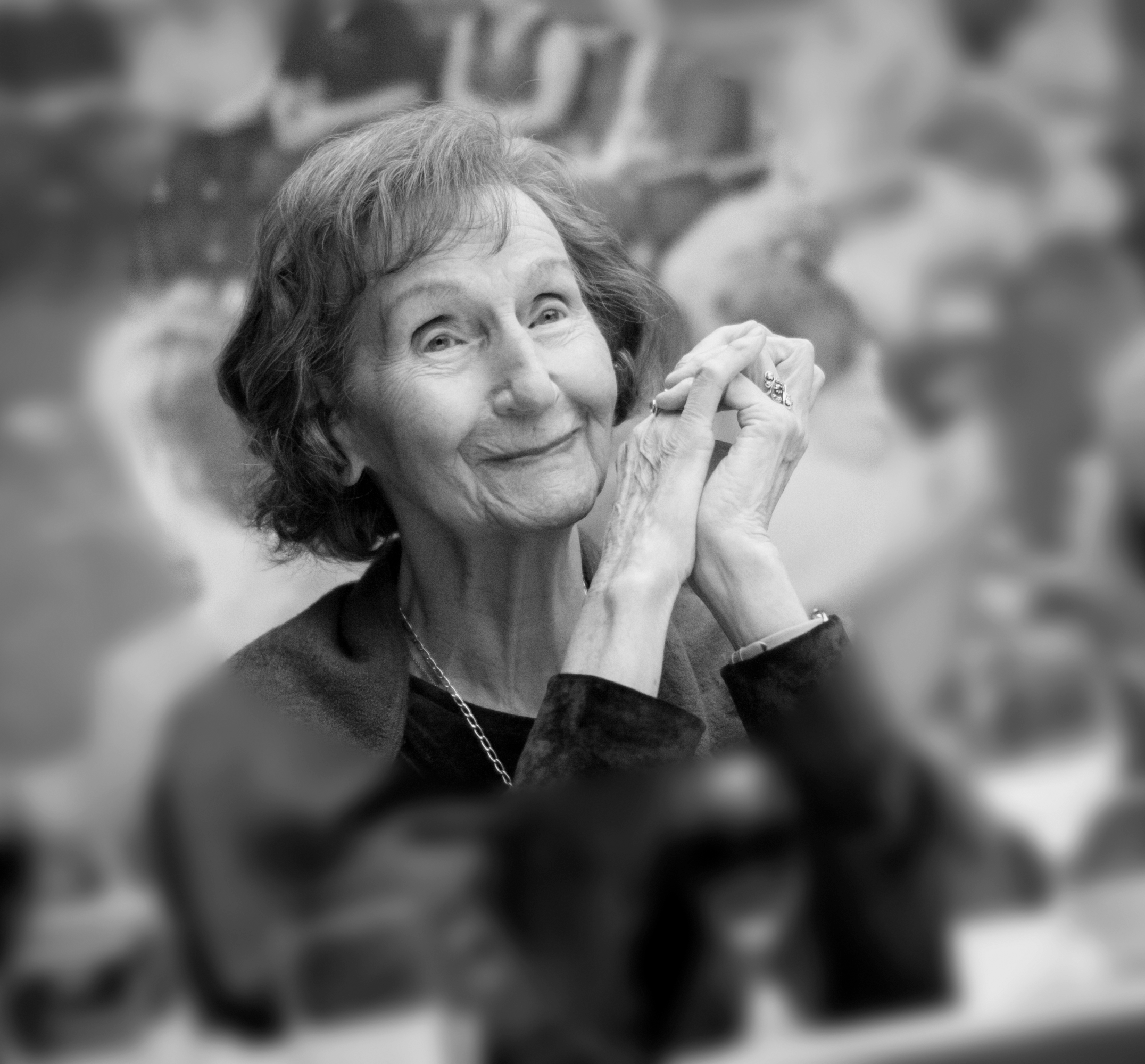Zofia Posmysz 1923-2022
We are deeply saddened to inform you that Zofia Posmysz passed away this morning (8.08.2022).
Former prisoner of the concentration camps Auschwitz-Birkenau, Ravensbrück and Neustadt-Glewe, writer, radio presenter, recipient of the Order of the White Eagle, honorary citizen of the city of Oświęcim, patron of the Special School and Educational Centre in Oświęcim. For us - a true friend of the house and an authority.
She was closely associated with the IYMC for many years, and we still remember her encounters with young people who visited our house, including the warm relations that connected her with young Germans who ran programmes as part of the VW seminars, but also her numerous meetings with the public in Oświęcim (and not only there), both here in our house and in virtual space over the last two years. Thanks to the testimony of Zofia Posmysz, her literary legacy and her extraordinary gifts to the IYMC - the short story " The Christ from Auschwitz" and the private archive donated to our Documentation Centre - a project series entitled "The History of Oświęcim" was launched in cooperation between the IJBS and the Konrad Adenauer Foundation. "Argument-Biography", among others the Polish, German and English edition of " The Christ from Auschwitz ", historical and literary workshops, the film "It is a pity that such a distance separates us..." and the exhibition "And so you became my only friend...", which can be seen in our house until September.
But above all, her death has left a big gap in the hearts of all our staff.
Mrs Zofia - rest in peace.
Funeral ceremonies for Mrs Zofia Posmysz will begin with Holy Mass at the Salesian Church in Oświęcim (10 Władysława Jagiełły, 32-600 Oświęcim) on 18.08.2022 at 12 o’clock, the last farewell will take place at 1.30 p.m. at the municipal cemetery in Oświęcim (Wiklinowa 5, 32-600 Oświęcim).
Zofia Posmysz was born in Kraków on the 23rd of August 1923. When the war broke out she was a pupil at a school of commerce. The new circumstances forced her to interrupt her studies for a certain time. Soon she took up her studies again in an illegal underground school. It was here among the participants of the illegal course that she came into contact with the underground press, distributed by her classmates. Probably as a result of the work of an informer, the whole group was arrested on the 15th of April 1942.
Zofia Posmysz was sent on the 30th of May 1942 to the women’s section of the main camp at Auschwitz, but she was there only a short while. One of the prisoners working on cleaning the banks of the Soła river managed to escape and in retaliation Zofia Posmysz’s whole sub-camp of some 200 people was sent to a punishment battalion located in Budy near Oświęcim. In inhuman conditions, starved and beaten, and above all forced to carry out heavy labour, the women struggled desperately to survive. After two months the surviving 143 members of the group were sent to Birkenau, where a women’s section of the camp had been opened. Birkenau was a new stage in the ordeal of the camps. It began dramatically for her – with typhus and dysentery decimating the prisoners, but soon came an unexpected change for the better: in March 1943 she was transferred to the camp kitchen and two months later was promoted to the function of book-keeper.
In January 1945, as the battle front approached, thousands of prisoners from KL Auschwitz-Birkenau were marched deep into Germany. That ‘Death March’, as it has become called, claimed a still uncalculated number of victims. Prisoners from Birkenau walked for almost three days and finally in biting frost were transported in open wagons to Ravensbrück. Zofia Posmysz was liberated by the Allies from the Neustadt-Glewe sub-camp on the 2nd of May 1945. She passed her matura in 1946 and took up the study of Polish literature at Warsaw University, combining this with night-work as a proof reader for one of the newspapers. Towards the end of her studies she began working for Polish Radio in its literary department.
In 1959 she wrote the radio-play, ‘The passenger in cabin 45’, that was decisive for her literary career. The resonance it evoked led quickly to its adaptation as a play for television, and the outstanding director Andrzej Munk decided to make a film of, ‘The Passenger’. The film – with among others the phenomenal role of Aleksandra Śląska as Liza – appeared on the screen immediately after the death of the director in 1963. A year earlier ‘The Passenger’ had appeared in the form of a novel and on the basis of that, in 1968, Mieczysław Weinberg composed the opera score to Aleksander Miedwiedew’s libretto. Its world premier at the Bregenz Festival in 2010 was a great artistic event, and consolidated the position of ‘The Passenger’, as one of the most important works on the subject of the camps, extraordinary and exceptional in so far as it combined the perspectives of the drama of war of both the victim and the oppressor, usually kept distinct.
The fame of ‘The Passenger’ somewhat overshadowed the other important works of Zofia Posmysz including the novels ‘Holiday on the Adriatic’, ‘Microclimate’ and ‘The Price’, the stories already mentioned and many radio plays, scripts and works on contemporary themes. The account of ‘The Christ from Auschwitz’, an elaboration of one of the episodes in ‘The Passenger’ is without doubt one of the most important elements of the testimony given by the life of this outstanding author, and extraordinary woman.


